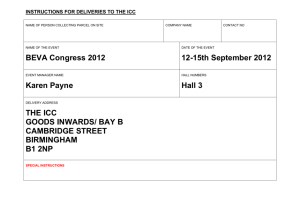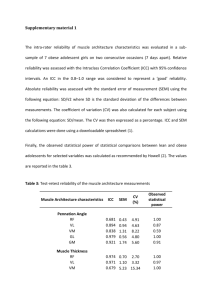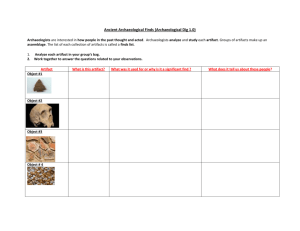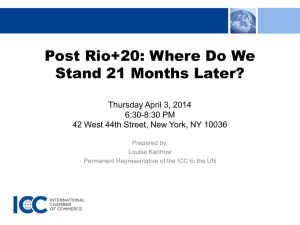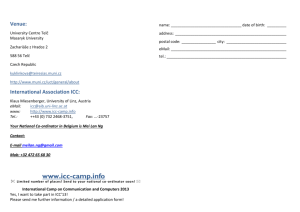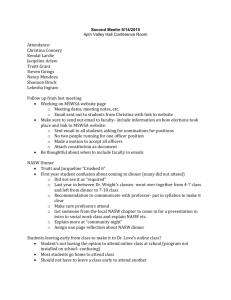ICC guidelines
advertisement
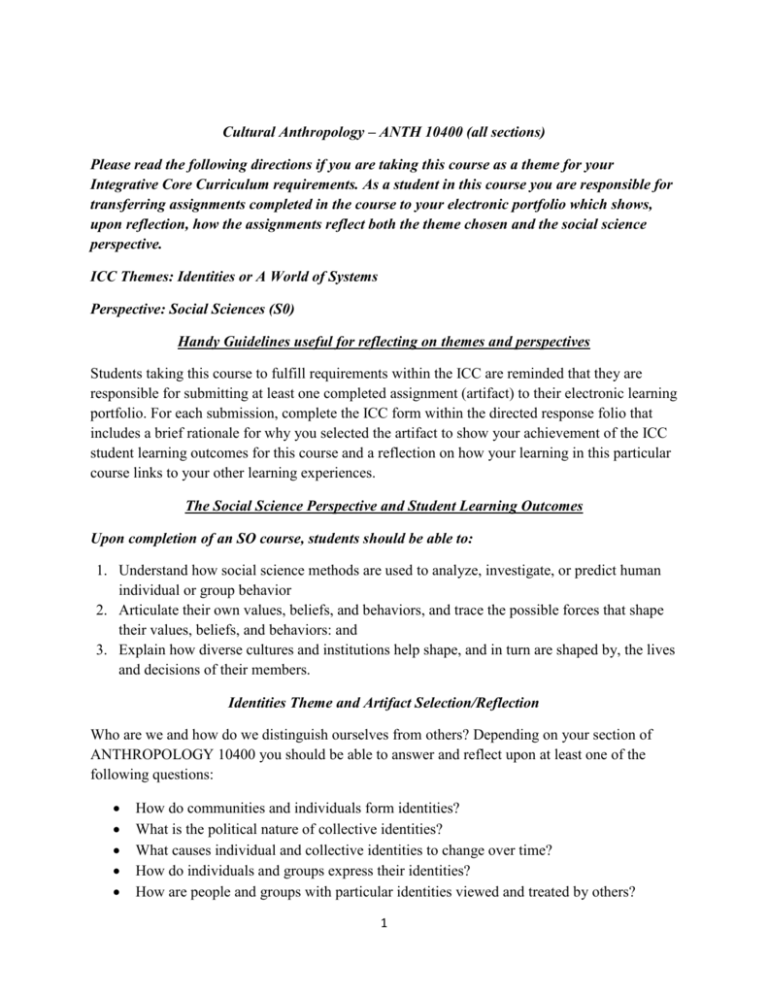
Cultural Anthropology – ANTH 10400 (all sections) Please read the following directions if you are taking this course as a theme for your Integrative Core Curriculum requirements. As a student in this course you are responsible for transferring assignments completed in the course to your electronic portfolio which shows, upon reflection, how the assignments reflect both the theme chosen and the social science perspective. ICC Themes: Identities or A World of Systems Perspective: Social Sciences (S0) Handy Guidelines useful for reflecting on themes and perspectives Students taking this course to fulfill requirements within the ICC are reminded that they are responsible for submitting at least one completed assignment (artifact) to their electronic learning portfolio. For each submission, complete the ICC form within the directed response folio that includes a brief rationale for why you selected the artifact to show your achievement of the ICC student learning outcomes for this course and a reflection on how your learning in this particular course links to your other learning experiences. The Social Science Perspective and Student Learning Outcomes Upon completion of an SO course, students should be able to: 1. Understand how social science methods are used to analyze, investigate, or predict human individual or group behavior 2. Articulate their own values, beliefs, and behaviors, and trace the possible forces that shape their values, beliefs, and behaviors: and 3. Explain how diverse cultures and institutions help shape, and in turn are shaped by, the lives and decisions of their members. Identities Theme and Artifact Selection/Reflection Who are we and how do we distinguish ourselves from others? Depending on your section of ANTHROPOLOGY 10400 you should be able to answer and reflect upon at least one of the following questions: How do communities and individuals form identities? What is the political nature of collective identities? What causes individual and collective identities to change over time? How do individuals and groups express their identities? How are people and groups with particular identities viewed and treated by others? 1 In sections 07 and 08 of ANTH 10400 it is suggested that students use either the kinship assignment or the research proposal as artifacts for submission to their e-portfolios required for completion of their ICC theme. A World of Systems Theme and Artifact Selection/Reflection How do people make sense of and navigate complexity? Keep in mind that, as we focus primarily on non-western and indigenous cultures, students can adapt the theme based questions to the study of other cultures. Depending on your section of ANTHROPOLOGY 10400 you should be able to answer and reflect upon at least one of the following questions: What is “systems thinking”, and how is it relevant to every discipline at Ithaca College? How have different systems of philosophical, literary, religious, and historical thought shaped the values we live by (or that ‘others’ live by)? What are the key social, political, and economic systems that affect our lives, and how do we recognize them? (Suggested review of Bodley’s chapter 13 “An Unsustainable Global System”) How do our systems of communicating and organizing information affect our lives? How do technology and the development of technology fit into the world of systems? What are the key systems that support life on this planet? How have systems of scientific methodology, and the knowledge we have obtained by them, changed over time? In sections 07 and 08 of ANTH 10400 it is suggested that students choose an appropriate topic for the research proposal assignment that would allow them to speak directly to the World Systems theme which fall under point 2 and 3 listed above. ICC artifacts/e-portfolios and student responsibility: Because the portfolio is designed to show student achievement of ICC outcomes (see the section on student learning outcomes at the end of this document), students should be encouraged to submit work that demonstrates they have achieved the ICC student learning outcomes for the course, not simply the assignment they liked best. Depending on the ICC student learning outcomes for your particular course, some artifacts (e.g., PowerPoint slides, interview transcripts) may need additional notes, reflection, or other explication of how the artifact demonstrates the student learning outcomes. For example, in evaluating the Ithaca Seminar outcome of developing and evaluating ideas and arguments, image artifacts that included brief statements about design choices or otherwise made the link between the artifact and the outcomes tended to be more readily evaluated than those that solely presented an image created within the course. 2 ICC and technical assistance Students who need technical assistance with portfolio submissions should be directed to the ITS HelpDesk. They can also check the ITS website for online instructional videos for getting started with TaskStream. ITS has tentatively scheduled TaskStream workshops for faculty on 1/27 at 11:00am and 1/30 at 4:00pm and for students on 1/28 at 11:00am and 1/29 at 4:00pm. Registration for the workshops will be available on the ITS website. Student Learning Outcomes for the Ithaca College Integrative Core Curriculum Overarching Outcomes of the ICC Upon completion of the Integrative Core Curriculum, students are able to: 1. Address a topic, issue, problem area, or human challenge using a combination of concepts, theories, and/or methods from multiple perspectives or fields of study; 2. Apply concepts, theories, methods, or skills to analyze new questions or complex problems; and 3. Engage in and communicate self-reflection about their learning in the ICC, their chosen major discipline, and their overall Ithaca College experience. If you require further assistance in order to complete your task of selecting artifacts for this course do not hesitate to set up an appointment to meet during office hours. 3
